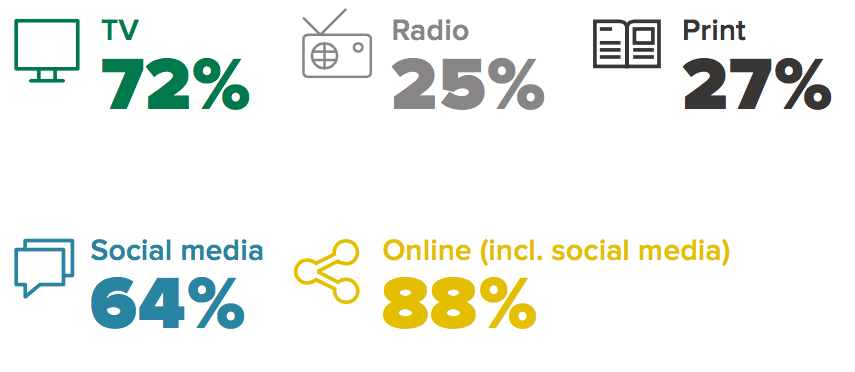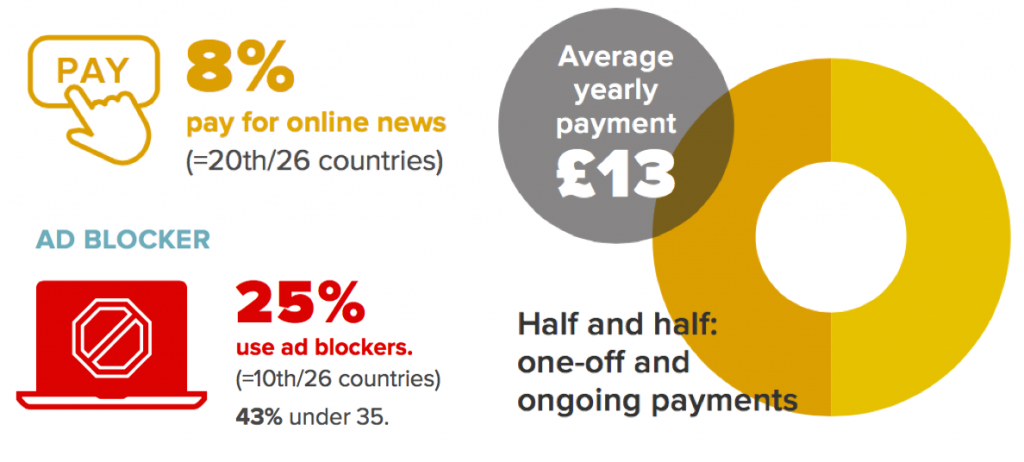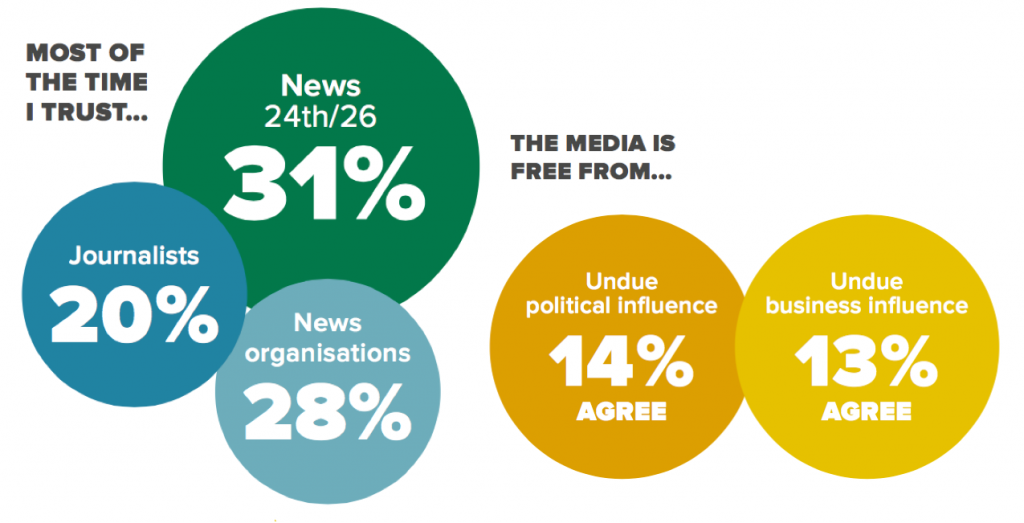| Statistics | |
| Population | 10m |
| Internet penetration | 76% |
Hungary’s conservative Fidesz party has sought to tighten its control over both the public and private media sector over the past year, leading to increased concerns about journalistic freedom and plurality.
Top Brands % Weekly Usage (TV, Radio and Print)
| Weekly use | Main source | |
|---|---|---|
| RTL Klub news | 57% | 26% |
| TV2 news | 41% | 12% |
| MTV news (M1) | 35% | 14% |
| ATV | 30% | 9% |
| Hír TV | 30% | 5% |
| Duna TV news | 24% | 3% |
| Blikk | 18% | 1% |
| HVG | 16% | 2% |
| Metropol | 15% | 2% |
| A regional or local newspaper | 13% | 2% |
| Bors | 9% | 1% |
| 168 óra | 8% | 0% |
| Echo TV | 8% | 1% |
| Népszabadság | 8% | 1% |
| CNN | 7% | 1% |
| Nemzeti Sport | 7% | 1% |
Top Brands % Weekly Usage (Online)
| Weekly use | Main source | |
|---|---|---|
| Origo news | 50% | 16% |
| index.hu | 46% | 17% |
| HVG online | 37% | 8% |
| MTV news online (hirado.hu) | 32% | 7% |
| ATV online | 32% | 5% |
| 24.hu | 30% | 6% |
| 444.hu | 23% | 3% |
| Blikk online | 21% | 2% |
| Website of a regional or local newspaper | 18% | 3% |
| 168 ora online | 16% | 1% |
| Népszabadság online | 12% | 1% |
| Bors online | 12% | 1% |
| Metropol online | 10% | 1% |
| Magyar Nemzet online | 10% | 1% |
| Vilaggazdasag online | 10% | 0% |
| portfolio.hu | 10% | 1% |
Overview of key developments
By Nic Newman
Research Associate, Reuters Institute for the Study of Journalism, with input from local sources
The media landscape – including the two most watched TV channels – has been through tumultuous, politically driven changes over the last year, with most Hungarian news brands controlled by politically engaged entrepreneurs. In February, a row erupted between PM Viktor Orbán and his former college room-mate, right-wing media mogul Lajos Simicska, triggered by the introduction of a 5% tax on advertising. 1
TV2 Media Group, which runs one of the other leading TV channels in Hungary was sold to the government film commissioner Andy Vajna in October but this sale is now subject to a legal dispute with a key ally of Lajos Simicska also claiming ownership. TV2’s Tények news progamme has lost around 500,000 viewers during the last two years. [61. https://index.hu/kultur/media/2016/03/23/ket_ev_alatt_tobbszazezer_nezot_vesztett_a_tenyek
At the same time M1, the main public TV channel was reshaped into a 24/7 news channel in March 2015, though early months were affected by a number of technical problems, accusations of pro-government bias, and falling audiences.
Meanwhile, the former editor and co-owner of Magyar Nemzet bought financial daily Napi Gazdaság in April and renamed it Magyar Idők (Hungarian Times), transforming it to a political daily more loyal to the government.
A new law ordering the closure of shops on Sundays, introduced in March 2015 has impacted press circulation. The only political newspaper appearing on Sundays, Vasárnapi Hírek (Sunday News), maintained sales by publishing on Saturdays, but the Sunday edition of the biggest daily tabloid paper Blikk has seen sales reduced by around a third.
Hungary’s biggest daily Népszabadság is now fully owned by Mediaworks Hungary Co, which bought shares from Ringier in 2014 and from the Szabad Sajtó Foundation which is closely linked to opposition socialist party MSZP.
Left-wing political weekly, 168 Óra was sold to a new owner who says he wants to keep the weekly’s political leaning. A free paper Lokál was launched in May by the prime minister’s unofficial adviser Árpád Habony. Habony also launched a news portal 888.hu mimicking the name of existing liberal news website 444.hu.The ex-editor-in-chief of Origo, one of the leading Hungarian news portals, launched a new investigative group called Direkt36, which is supported by donations instead of advertising, and publishes its articles through 444.hu.
Magyar Telekom, a subsidiary of Deutsche Telekom, sold the second biggest news website Origo to New Wave Media Ltd for almost 4.2 billion HUF (c.€13.2m) in December. New Wave Media, which has links to the government, also publishes vs.hu, another important Hungarian news website. Index.hu remains by far the most popular Hungarian news portal thanks to its relaxed tone and relative independence, although it is owned by a right-wing businessman.
WEEKLY REACH PER DEVICE

WEEKLY REACH PER SOURCE

Paying for news
Paying for online news is rare in Hungary with most news websites supported by advertising.
Trust
The politically polarised media landscape has contributed to the low levels of overall trust. Very few Hungarians think that the media are free from political or commercial influence and the two are often closely linked. Because of the small size of the market there is much less money for in-depth reporting compared to Western European countries.
Scroll data area to see more
TOP SOCIAL NETWORKS*
| RANK | NETWORK | ALL | U35s |
|---|---|---|---|
| 1 | 60% | 57% | |
| 2 | YouTube | 22% | 23% |
| 3 | Google+ | 8% | 4% |
| 4 | 5% | 6% | |
| 5 | Viber | 4% | 4% |
- https://index.hu/kultur/media/2015/02/06/lemondott_a_simicska-medibirodalom_teljes_vezetese After Simicska said he was declaring war on Fidesz, a number of his senior media editors resigned, including those from conservative newspaper Magyar Nemzet, Lánchíd Radio, and Hír TV.
The advertising tax was also criticised by RTL Klub, a private television channel with the highest-rated TV news programme. After a secret deal between the government and German owner Bertelsmann, RTL Klub’s news programme moderated its criticisms and the CEO was fired after 14 years in the job. [60. http://www.mmonline.hu/cikk/eldolt_tavozik_dirk_gerkens ↩


